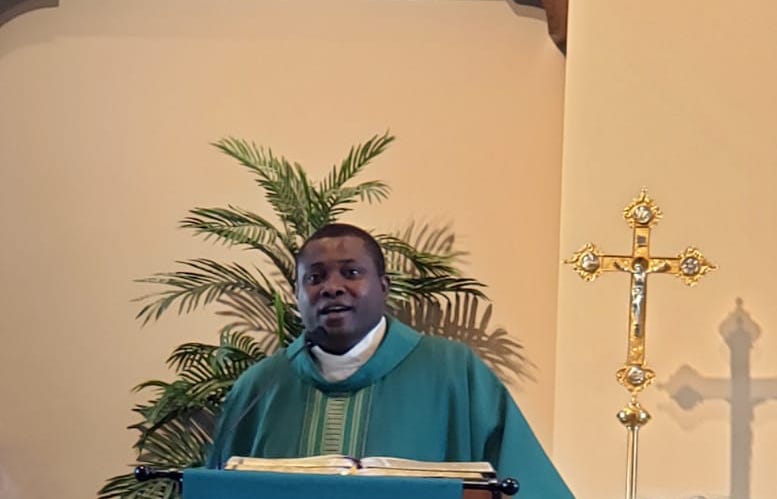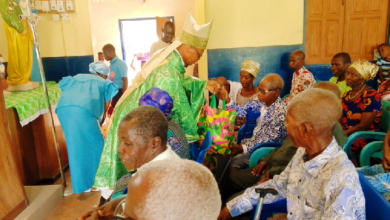30th Sunday in Ordinary Time, Year A – October 26, 2014

Exodus 22:20-26/ Psalm 18/1Thess 1:5-10/ Matthew 22:34-40
Theme: You bear the image of love
Last week, I reminded you that we bear the image of God and so our responsibility is greater; a responsibility which makes us greater than Caesar’s image on the coin. Today, we are invited to reflect on one of the images of God which we bear, namely LOVE. Love is at the heart of God’s creation.
In the Gospel Reading, the Religious Leaders during Jesus’ time were not satisfied with trapping Jesus. Today, it is a Lawyer who becomes an instrument of that trap. He asked Jesus, “Teacher, which Commandment in the Law is the greatest?” He said to him, “You shall love the Lord your God with all your heart, and with all your soul and with all your mind…you shall love your neighbour as yourself” (Matthew 22:36-39). By Jesus’ answer, the Pharisees stand condemned because, they failed to love Him who is God and neighbour to them.
Jesus reminded them that on the Commandment of love hang the Law and the Prophets. Indeed, Jesus is the fulfillment of the Law and the Prophet.
We are called upon to reflect this image of love as we prepare to meet the King of Kings who comes to judge the living and the dead. This is because, we will be judged according to the law of love.
Indeed, the King we are awaiting shows us that a man can have no greater love than to lay down his life for his friends. Jesus did not only say this, he demonstrated it by dying on the Cross for us while we were still sinners.
The First Reading gives us practical ways by which we can reflect this image of love by loving God and our neighbour as ourselves.
To begin with, Moses exalts the Israelites “Whoever sacrifices to any god other than the Lord alone, shall be devoted to destruction” (Exodus 22:20). Condemnation is there for those who refuse to acknowledge God’s sovereignty; those who refuse to love God with the totality of their being.
Another sin against the commandment of love, Moses admonished them is “You shall not oppress a resident alien for once you were an alien in Egypt” (Exodus 22:21).
Justice and righteousness are the foundations of God’s throne. It is said that the oppressed is the worse oppressor. The converse should have been true. This is because one who has been oppressed must rather be compassionate. How do we treat widows and orphans in our communities, both in the Church and in secular society?
Often, we treat them with contempt forgetting that they hold the key to unlocking our entrance to heaven.
According to the Book of James, “If any think they are religious and do not bridle their tongues but deceive their hearts, their religion is worthless.
Religion that is pure and undefiled before God is this: care for orphans and widows in their distress” (James 1:26-27). Knowing the plights of orphans and widows, Jesus Himself showed compassion to them.
A case in point was when Jesus raised to life the son of the widow of Nain. Jesus, by this action, restored hope to this poor widow whom hitherto will have been without any inheritance according to their Jewish custom.
A little bit of love shown to such people will restore their hope. This is our duty as Christians who bear the image of God and it is upon this that we will be judged.
Furthermore, Moses warned them against lending money to the poor at usury. Jesus paid the debt that we did not owe. The moment we fail to restore dignity to the poor of our society, we miss heaven (Matthew 25:45ff).
To have poor people among us is a blessing. It is a privilege to support the poor people in our communities. This is because they hold the key to our salvation. In this regard, I duff my cup to the St. Vincent De Paul Society in our various Parishes.
In last week’s Gospel Reading, when Jesus answered them on the issue of payment of tax, the Pharisees were amazed.
However, in today’s Gospel, we realised that such amazement only led them to trap Jesus all the more instead of causing them to repent. Are you amazed or fascinated about Jesus? Is that amazement or fascination bringing about conversion in your life?
By Jesus’ answer “You shall love the Lord your God with all your heart, with all your and with your entire mind”, Jesus affirms again what it means to give to God what belongs to God. God demands of us a total self- giving.
We are reminded that fulfilling your social responsibility does not mean a denial of God and giving yourself totally to God does not mean a denial of your social responsibility. They complement each other.
Pope Benedict XVI’s 2005 Encyclical Letter “Deus Caritas Est” (God is Love) sums up beautifully the message of today’s Scripture readings:
“Being Christian is not the result of an ethical choice or a lofty idea, but the encounter with an event, a person, which gives life a new horizon and a decisive direction. (…) In acknowledging the centrality of love, Christian faith has retained the core of Israel’s faith, while at the same time giving it new depth and breadth.
The pious Jew prayed daily the words of the Book of Deuteronomy which expressed the heart of his existence: ‘Hear, O Israel: the Lord our God is one Lord, and you shall love the Lord your God with all your heart, and with all your soul and with all your might’ (6:4-5). Jesus united into a single precept this commandment of love for God and the commandment of love for neighbour found in the Book of Leviticus: ‘You shall love your neighbour as yourself’ (19:18; cf. Mark 12:29-31). Since God has first loved us (cf. 1 John 4:10), love is now no longer a mere ‘command’; it is the response to the gift of love with which God draws near to us.”
In conclusion, “…The fruit of faith is LOVE. The fruit of love is SERVICE. The fruit of service is PEACE says Blessed Mother Teresa.” The face that we bear is the image of love and that love will bear us witness on the day of judgment.
May Blessed Teresa of Calcutta teach us how to love God and neighbour in unity and harmony.
by Rev. Fr. Aaron Agbeshie Agorsor.



